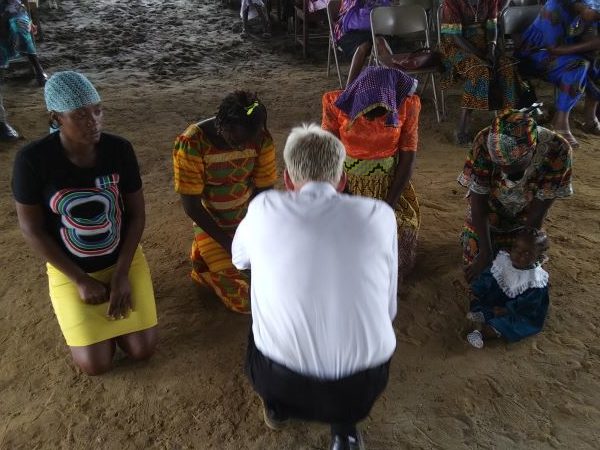Repentance
By Thomas Thorne
McDowell County
The apostle Peter told us in Acts 2:38, “Repent and be baptized every one of you in the name of Jesus Christ for the forgiveness of your sins, and you will receive the gift of the Holy Spirit.” Clearly, repentance, which is commonly thought of as “being sorry for our sins” is a necessary step toward forgiveness and the receipt of the Holy Spirit. Is “being sorry for our sins” all there is to repentance?
The word repentance comes from the Hebrew verb shuv, which means to “turn back, return, bring back, go back, turnabout, turn oneself.” In 1 Kings 8:48 and 2 Chron. 6:38 the word is translated as “repent.” In Isaiah 58:12 a different conjugation of the verb shuv is translated as “restorer.” So we can see that to “turn back,” “return,” or “restore” are all related to the term “repent.”
Now consider, turning, returning, turning back, or restoring requires action. For us to “turn” requires that we make a change. If we are heading in one direction and we make a 180-degree turn, we need to stop, re-orient our thinking and our path of travel, turn around, and go in the other direction. We don’t just stop, pause, and head back on the same path as before. We literally and physically make a change in direction. And this is the crux of repentance, change.
Now, I’m going to make a statement here that I think we as believers in Jesus will all agree with. “We all want to follow Jesus as much as possible and we want to do what is right!” In the rest of this article plus next months I would like to remind us of what has been considered as the six elements that constitute full repentance. The kind of repentance we all are trying to achieve. The six elements are:
- Recognition of one’s sins as sins
- Remorse-sorrow
- Confession
- Desisting from sin – Stopping the sin
- Forgiveness
- Restitution where possible
The first element, “recognition” of one’s sins as sins is an act of one’s intelligence, moral conscience, and relationship with God. It involves knowing that certain actions are wrong and sinful. Recognizing that such actions are not according to the teachings of God and analyzing one’s motives for these sinful actions as deeply as one can. In the business vernacular, this would be called “root cause analysis.”
For example, stealing must be seen not only as a national crime but also as a sin against another human and a violation of God’s eternal commandments. It also involves realizing that such acts are motivated by some of the darkest elements in our being, elements that we need to root out. The first element is that we recognize sin as sin. Recognize that it is wrong and that if we are participating in it, we are not following our God, and our actions are wrong!
The second phase, “remorse” or “sorrow” is a feeling. It is composed of feelings of regret and of failure to maintain one’s moral standards. It may also encompass feelings of being lost or trapped, anguish, despair at our sinfulness, and a feeling of being alienated from God and our own deepest spiritual roots. Although, after repentance, we do our best never to participate in such actions again, these negative feelings need not remain. After we have recognized that what we have done was wrong and that we have not followed the teachings of God we will be sorry for our wrong actions. The second element of full repentance is having remorse, being sorry.
“Confession,” the third element, has two forms: James 5:16 tells us to “Confess your sins to one another and pray for one another, that you may be healed. The prayer of a righteous person has great power as it is working” (James 5:16 ESV). There is also an individual confession of our sins to God. Psalm 32:5 tell us, “I acknowledged [confessed] my sin to you, and I did not cover my iniquity. I said, I will confess my transgressions to the LORD, and you forgave the iniquity of my sin” (ESV).
Psalm 51 is David’s prayer of repentance after his sin with Bathsheba. In verses 1-4, David cries out, “O God, according to your steadfast love; according to your abundant mercy blot out my transgressions. Wash me thoroughly from my iniquity and cleanse me from my sin! For I know my transgressions, and my sin is ever before me. Against you, you only, have I sinned and done what is evil in your sight, so that you may be justified in your words and blameless in your judgment” (Psa. 51:1-4 ESV).
1 John 1:8-10 tells us “If we say we have no sin, we deceive ourselves, and the truth is not in us. [But], if we confess our sins, he is faithful and just to forgive us our sins and to cleanse us from all unrighteousness. If we say we have not sinned, we make him a liar, and his word is not in us” (1 John 1:7-10 ESV). The more specific the confession, the better. The third element of full repentance is confession.
We have covered three elements of repentance: recognition, remorse–sorrow, and confession. In next month’s article, we will review the last three and discuss how they all tie together and result in “full repentance.”:
Acts 2:38, “Repent and be baptized every one of you in the name of Jesus Christ for the forgiveness of your sins, and you will receive the gift of the Holy Spirit.”
Shalom Shalom everyone,
Tom Thorne
____________________________________________
Tom Thorne and his wife (Amy) moved to Marion from Denver, NC almost a year and a half ago. Thomas and Amy are fellowship leaders of a small congregation of Believers called “Servants of the Most High God.” Tom can be reached at servantsotmhg@gmail.com
____________________________________________
Read more Christian news here.







